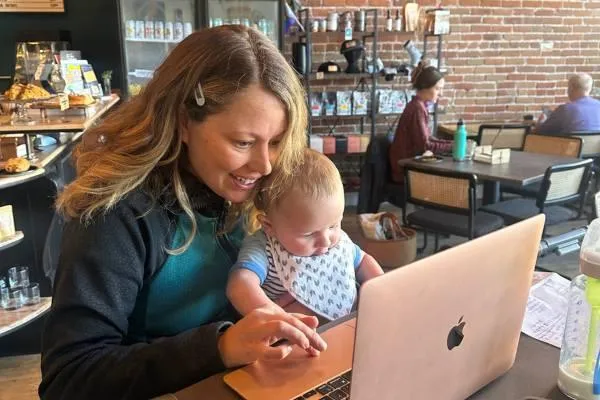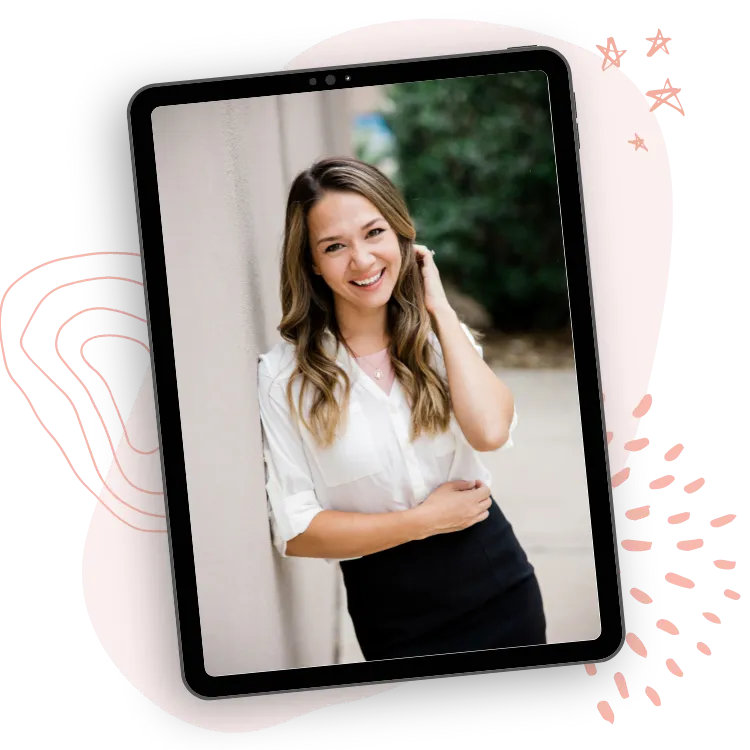BLOG
Suspendisse pulvinar metus vitae finibus interdum

EDVOLUTIONARY Parent- The Origin Story
Hello there!
My name is Alexis and I am one of the co-founders of EDVOLUTIONARY.
Depending on how we met, you may also know me as Alex or Ali (long story...best for another time).
If we’re just meeting… choose whichever name you like best!

A little about my background
I was a teacher for 10 years and in that time taught every grade from Kindergarten to 6th at least once, as well as some Pre-K while I earned a Montessori certification.
I started out my teaching career in upper elementary and middle school, but as I grappled with engaging my students and searched for solutions on how to reignite their motivation and excitement to learn, I started to realize just how much their orientation toward learning in the upper grades was formed by their experiences in the younger grades.

And whatever we were doing in the younger grades was kicking off…or at least exacerbating… this disengagement from curiosity and the intrinsic motivation to learn.
Humans are learning animals by nature, so the fact that a large portion of our students disengage from school every year means that something is epically amiss with how we are doing it.

I had to investigate.
And so... I spent my last few years in the classroom teaching kindergarten and first grade and experimenting with how we can structure learning differently so we don’t turn off that natural human drive to learn.
You can find out more about my work with EDVOLUTIONARY here.

However... a child’s foundation for lifelong learning obviously starts even earlier than their first formal instruction in pre-k or kindergarten.
As I was going through the process of earning my Montessori credential for ages 2.5- 6, I learned just how important the first 3 years are to the rest of a person’s life.

Even though that time is largely unconscious, children are absorbing what their environment is telling them about themselves and and the nature of the world around them.
There are also critical phases of development in the first 6-7 years that only last a brief time.
While the human brain keeps growing throughout our lives, and it’s never too late to learn, these windows make it particularly easy to acquire certain skills at that time.

Even more importantly, if we create obstacles to the work every child naturally does to meet these developmental needs, we can can unintentionally cause them to seek to meet those needs in increasingly unproductive ways as they get older. (Ask any teacher of older students).
But I didn’t have any opportunity (or let's be real...interest) to work with children from 0 to 3 until...

...the birth of my son, Wyatt.
EDVOLUTIONARY's next frontier
As I was preparing to become a parent, friends and family started to say, "Oh… you think you know something about child development? Well just WAIT until the toddler years. Your kid will show you!"
And he might.
As I write this Wyatt is just over four months old so I have a little time before the cards are on the table.
Admittedly, prior to Wyatt arriving on the scene I knew very little about any child before the age of 2.5 where my Montessori training began.
But what I knew from my experience teaching all those grades from K to 6th is that part of what forms the toddler I should be wary of was the infant that came before him, just like part of what formed the disengaged 6th grader was the first grader who came before her.
I felt like I should know at least more than nothing about the kinds of things he needed (or didn't need) beyond food, sleep and relief from being Mr. Grumpy Poopy Pants.
And having grown up as a child with a lot of time to be creative (aka bored), our culture's focus on constantly entertaining young children didn't sit well with me.

I wanted to know how to do things differently so I could foster a secure relationship with Wyatt but also create the conditions where he could become the primary actor in his own life and not end up needing constant attention and validation from me.
Have you ever noticed that there is SO MUCH information out there?

Its a blessing and curse.
A blessing because I’ve read in many places that “parenting” is not necessarily something that comes instinctively to we humans. To some degree we have to learn how to do it (just like pretty much anything else we can do from walking to talking).
Our ancestors and even just a few generations of human ago were constantly around large communities or families of children and learned from watching others and having to help do it. But as families have shrunk and settled great distances from one another, most of us in modern times have rarely had to spend much time taking care of young children until we have our own.
So it’s a blessing the interwebs have come along to help us.
But the plethora of information out there is also a curse.
Who has time to sort through all of it?
AND... not get so paralyzed by the quantity of competing information that you stop doing the most important thing you can naturally do as a parent…which is observe your child, get to know them and what their rudimentary communication skills are trying to say, and respond to them.

I wanted to know just enough that I could set the foundation for a strong parent-child relationship while ensuring Wyatt was growing in independence, social skills and making the most of the sensitive periods of development that appear for only a brief windows of time from 0-6.
Just enough information that I could cut through the noise of what pop culture said I should or should not be doing...but not so much that it lead me away from my own instincts of observing and responding.
EDVOLUTIONARY Parent
While I couldn’t find a resource that was quick and efficient for the time-poor new parent (aka me), I did find many wonderful books and resources that I could dive into and put together the information I was searching for.
I was fortunate to know what philosophy of relating to children aligned with my own beliefs, so I had a clear starting point (you can see a linked list of my influences below).
And fortunate that this kind of stuff makes up my weekend fun reading anyway (not joking).
I originally founded EDVOLUTIONARY because I wanted an easy to implement instructional approach better aligned to the psychological and biological needs we humans have evolved with so I had the highest possible chance of unlocking students' potential AND making life easier for the adults who support them.

EDVOLUTIONARY Parent is based on that same premise.
Give your kid the things they developmentally need = make parent life a bit easier.

If you are a parent who wants to know just enough about your developing child to plant the foundation of secure attachment, independence, strong social skills and best support your child through key learning windows…while NOT getting so much information that you are totally overwhelmed… come and join me on this journey.
I'll be creating these resources for myself and Wyatt each month... and then sharing with you... for the next 6 years at least.
Learn more about the philosophy behind EDVOLUTIONARY at Home here.
The inspiration behind EDVOLUTIONARY Parent
Get my whole reading list here! Coming soon.... (I read these so you don't have to!)
The Montessori Baby
The Montessori Toddler
The Montessori Book for Babies & Toddlers
Babies Build Toddlers
Positive Discipline in the First Three Years
The Myth of the Spoiled Child
The Whole- Brained Child
Raising Good Humans
Bringing Up Bebe
Hunt, Gather Parent
Free to Learn
.

FREE DOWNLOAD
Headline that hooks people in and makes them want to sign up.
Add a subline here lorem ipsum dolor sit amet, consectetur adipiscing elit praesent ut neque ipsum mauris sit amet urna consectetur
© Copyright 2023 Business Name.
